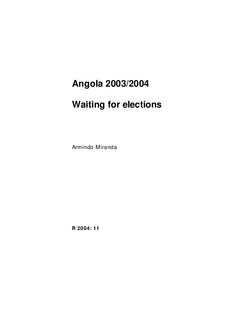| dc.description.abstract | The present report is the fifth in a series of annual studies carried out by the Chr. Michelsen Institute on socio-economic and political trends in Angola, at the request of the Norwegian development cooperation authorities. This year’s report focuses on the political situation in Angola, in the context of the upcoming parliamentary and presidential elections – the first since 1992.
In 2003-2004 Angola continued to make notable progress in its socio-economic recovery from nearly three decades of war. But the most significant event on the political arena was theannouncement that the ruling regime would consent to hold elections in 2006, fourteen years after the first – and so far, only - multiparty elections in the country’s history. The present report discusses the roles of the various actors in the political process, including the attitudes and expectations of the population, which were recently the object of a pioneering opinion poll conducted by AIP. A sobering message is that elections – however essential to the democratisation process – is not likely to result in less power for the current president and his party. | |
